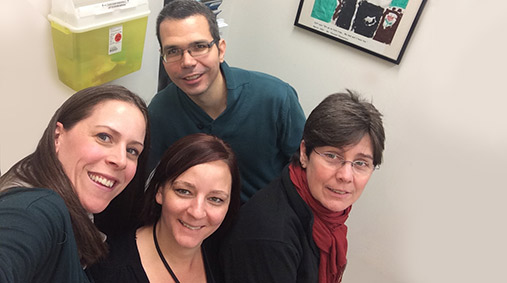Engage, empower, attach
When social worker Heidi Schmidt talks about the challenges of connecting marginalized individuals to health care, one fellow in particular highlights the success of the primary care outreach team. “He had no family doctor and needed methadone treatment for his drug addiction. But now, if he’s walking by Raven Song, he knocks on my office window to say hi to me,” she laughs. “We joke that he’s a little too engaged.”
But that is the goal of the outreach team: to engage, empower and attach individuals in need of health care to Raven Song’s Primary Care High Needs and Stabilization Clinic. Four days a week the team heads to the lobbies of eight sites—including supported housing, shelters and drop-in centres—to get to know potential clients. They also reach out to the homeless population in nearby parks and alleyways in the early mornings.
Building relationships
“The likelihood of these clients making it to Raven Song on their own is low,” says Andie Stowe, an addictions counsellor. “But when we build a relationship with them, in their home environment where they are comfortable, eventually we can bring them to the clinic for their ongoing care.”
Eliza Henshaw, a nurse practitioner, agrees with Andie that it’s not about providing medical treatment on site although they do provide crisis intervention or wound care if the situation calls for it.
“It’s more about relationships than service,” she says. “We establish a rapport so that we can catch them when they’re ready to seek help. We hold time for same-day urgent needs, because if we don’t connect them to care as fast as possible, they will continue to slip through the cracks of our health care system.”
And when that happens, sometimes the emergency department becomes their primary care provider.
“By going out into the community, we are removing barriers to primary care, mental health and addiction support,” adds Heidi. “The end goal is to reduce their reliance on the emergency department.”
Empowering clients
Many of the outreach team’s clients have been marginalized for so long, previously living on the Downtown Eastside. Some have even had negative experiences with health care professionals. They’re missing basic health care essentials, including screening for sexually transmitted infections or HIV.
It takes time, but the team is seeing the results of their efforts.
“Last week was great. A young woman with substance use issues we’ve been trying to connect with for six months finally came to Raven Song and met with a counsellor,” shares Eliza. “In my experience, the women who eventually come to the clinic, even for a pap test, feel empowered by taking control of their health.”
A team approach
The team travels to the supported housing sites together. It ensures their own safety but also gives clients access to a wealth of experience and knowledge—their roles cover addiction, mental health, supported housing, social work and nursing.
“We are a unique team in that we are truly interdisciplinary,” says Heidi, who also works with community agencies to build their outreach capacity and better understand the health care system. “It’s pretty awesome. I wish I could focus one hundred per cent of my time on outreach.”

